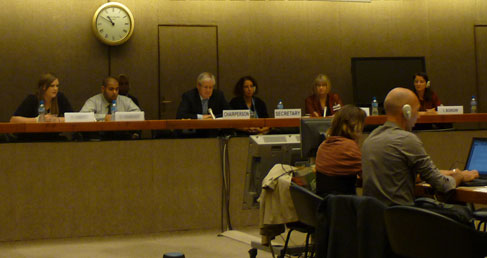When dad is behind bars...
Thu, 22 Dec 2011 10:13:00 GMT
Inspirational teenagers tell the UN how they cope while a parent is in prison

Siân and Raheel (far left) at the United Nations
TWO teenagers with fathers serving lengthy jail terms are playing an important role in a University of Huddersfield project that is probing the plight of youngsters whose parents are imprisoned. And they made history when they became the first young people to address a meeting of an important United Nations organisation when it met in Geneva.
The University is the UK leader of a research project named COPING, funded by the EU to the tune of 2.8 million euros. Launched in 2010, it is due for completion in 2013. Other countries taking part are Germany, Sweden and Romania, and a total of ten universities and agencies are participating.
The goal is to investigate the difficulties that young people face when parents are in prison and to find ways to improve their lives. As part of the research process, all of the partner countries are interviewing 250 children and following this up with 40 in-depth case studies. Meanwhile, existing services that help children and families in each country are being appraised. Ultimately, recommendations will be made to key policy makers.
One of the University of Huddersfield team working on the COPING Project is social work lecturer Ben Raikes. His role is to ensure that the project remains child-centred, he says, and explained that the COPING team works closely with the Manchester-based Partners of Prisoners Support Service (POPS), crucial in recruiting children to take part in the study. Among them were 13-year-old Siân, from Warrington, whose father is serving a 19-year sentence, and Raheel, aged 17, from Manchester, whose father received a seven-year term.
These two youngsters were ideal candidates to accompany members of the COPING team to Geneva for a United Nations day of discussion on the children of imprisoned parents, organised by the UN’s Committee on the Rights of the Child.
And this was the first time that the Committee had actually invited young people to take part in the proceedings. Siân and Raheel were selected and, with members of the COPING team, they prepared a special presentation. It vividly highlighted the difficulties they had undergone and stressed many of the problems faced by young people whose parents had been jailed.
They emphasised how small changes can have a big impact, such as having sofas installed in the prison visiting rooms, making visits more natural and allowing closer contact. Both youngsters said that they were attending the UN meeting in order to inspire changes in the prison system and they suggested ways that young people can fight isolation, get information about how to cope and seek out supportive organisations.
The presentation went down well. “They stormed it!” said Ben Raikes, one of the COPING researchers who went to Geneva, alongside Kris Christmann, a research fellow in the University of Huddersfield’s Applied Criminology Centre, and PhD researcher Amanda Swallow, of the University’s Centre for Applied Childhood Studies.
Future plans for COPING include a meeting in Germany. And Siân and Raheel – uplifted by their performance in Geneva – are keen to attend that too. Also, there are plans for Siân to talk to social work students at the University of Huddersfield.







